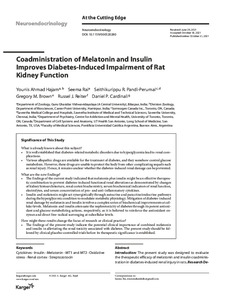Por favor, use este identificador para citar o enlazar este ítem:
https://repositorio.uca.edu.ar/handle/123456789/13640| Título: | Coadministration of melatonin and insulin improves diabetes-induced impairment of rat kidney function | Autor: | Hajam, Younis Ahmad Rai, Seema Pandi Perumal, Seithikurippu R. Brown, Gregory M. Reiter, R. Cardinali, Daniel Pedro |
Palabras clave: | CITOQUINAS; INSULINA; MELATONINA; ESTRES OXIDATIVO; CORTEZA RENAL; NEUROENDOCRINOLOGÍA | Fecha de publicación: | 2021 | Editorial: | Karger | Cita: | Cardinali, D. P., Hajam, Y. A., Rai, S. et al. Coadministration of melatonin and insulin improves diabetes-induced impairment of rat kidney function [en línea]. Neuroendocrinology. 2021. doi: 10.1159/000520280. Disponible en: https://repositorio.uca.edu.ar/handle/123456789/13640 | Resumen: | Abstract: Introduction: The present study was designed to evaluate the therapeutic efficacy of melatonin and insulin coadministration in diabetes-induced renal injury in rats. Research Design and Methods: Diabetes was achieved by giving streptozotocin (15 mg/kg) for 6 consecutive days. The diabetic condition was confirmed by assessing the blood glucose level; animals having blood glucose levels above 250 mg were considered as diabetic. Following the confirmation, animals were randomly divided into different experimental groups, viz group I served as the control (CON), group II diabetic (D), group III D+melatonin (MEL), group IV D+insulin (INS), group V D+MEL+INS, group VI D+glibenclamide (GB), group VII CON+MEL, group VIII CON+INS, and group IX CON+GB. Following the completion of the experimental period, animals were sacrificed, blood was collected via a retro-orbital puncture, and kidneys were harvested. Diabetic rats exhibited a significant increment in blood glucose and biochemical indexes of renal injury (tubular disruption, swollen glomeruli with loss of glomerular spaces, and distortion of the endothelial lining) including augmented levels of serum creatinine, urea, uric acid, Na+, and K+, and inhibition/suppression of the activity of glutathione (GSH) peroxidase, GSH reductase, glucose-6-phosphate dehydrogenase, and GSH-Stransferase in the renal cortex. Results: By examining thiobarbiturate reactive substances, reduced GSH, superoxide dismutase activity, and catalase activity in the renal cortex of control and diabetic rats, it was documented that treatment with melatonin or insulin alone or in combination showed a significant ad integrum recovery of GSH-dependent antioxidative enzymatic activities. Melatonin and insulin coadministration caused greater reductions in circulating tumor necrosis factor-α, tumor growth factor-β1, interleukin (IL)-1β, and IL-6 levels in diabetic rats, whereas IL-10 levels increased, as compared to each treatment alone. Diabetic rats showed a significant increase in the expression of both MT1 and MT2 melatonin receptor genes. Melatonin or insulin treatment alone or in combination resulted in significant restoration of the relative expression of both melatonin receptors in the renal cortex. Conclusion: The coadministration of exogenous melatonin and insulin abolished many of the deleterious effects of type 1 diabetes on rat renal function. | URI: | https://repositorio.uca.edu.ar/handle/123456789/13640 | ISSN: | 1423-0194 | Disciplina: | MEDICINA | DOI: | 10.1159/000520280 | Derechos: | Acceso abierto | Fuente: | Neuroendocrinology. 2021 |
| Aparece en las colecciones: | Artículos |
Ficheros en este ítem:
| Fichero | Descripción | Tamaño | Formato | |
|---|---|---|---|---|
| coadministration-melatonin-insulin.pdf | 977,79 kB | Adobe PDF |  Visualizar/Abrir |
Visualizaciones de página(s)
49
comprobado en 27-abr-2024
Descarga(s)
122
comprobado en 27-abr-2024
Google ScholarTM
Ver en Google Scholar
Altmetric
Altmetric
Este ítem está sujeto a una Licencia Creative Commons

